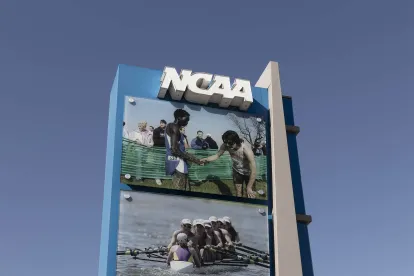The NCAA has announced a new set of guidelines designed to address the evolution of legalized sports gambling while protecting the sanctity of college sports and athletes.
“The new NCAA guidelines … recogniz[e] that college athletes may stumble and make mistakes along the way, but they should be granted the opportunity to learn and grow from their experiences.”
The rise of sports wagering has prompted the need for effective regulation to ensure fairness and integrity amongst athletic institutions at professional and collegiate levels. Additionally, there has been a growing concern over the increasing number of young adults engaging in sports wagering nationwide. A recent survey conducted by the NCAA found that 67% of college students living on campus have engaged in at least one sports betting activity. A recent survey conducted by the NCAA found that 67% of college students living on campus have engaged in at least one sports betting activity.
The new NCAA guidelines focus on enforcing stringent policies and preserving the integrity of competition in college sports while recognizing that college athletes may stumble and make mistakes along the way, but they should be granted the opportunity to learn and grow from their experiences.
Applying to all wagering-related violations reported on or after May 2, 2023, the new rules enforce a potential permanent loss of collegiate eligibility for those college athletes who engage in various prohibited activities such as engaging in activities to influence game outcomes, betting on their own games, betting on other sports within their school, or knowingly providing information with individuals engaged in sports betting. The guidelines also provide:
- If a student-athlete wagers on their own sport at another school, education on sports wagering rules and prevention will be required as a condition of reinstatement, and the loss of 50% of one season of eligibility will be considered.
- For all other wagering-related violations (e.g., wagering on professional sports), cumulative dollar value of the wagers will be taken into consideration with the following terms for reinstatement:
- $200 or less: sports wagering rules and prevention education.
- $201-$500: loss of 10% of a season of eligibility, plus rules and prevention education.
- $501-$800: loss of 20% of a season of eligibility, plus rules and prevention education.
- Greater than $800: loss of 30% of a season of eligibility, plus rules and prevention education.
Moreover, NCAA reinstatement staff are instructed to consider whether additional loss of eligibility, including permanent ineligibility, is necessary for cumulative wagering activities that significantly exceed $800.
Prior to the legalization of sports wagering, reinstatement guidelines called for college athletes who wagered on sports at any level, in most cases, to lose one full season of collegiate eligibility. Under the new guidelines, the NCAA aims to modernize in light of the reality that many states have legalized sports wagering and made it accessible online. It conveys a strong message that such behaviors will not be condoned, even in regions where sports gambling has been legalized, but recognizes a sliding scale and flexibility is appropriate.
The NCAA acknowledges the potential for personal growth and learning from mistakes. Thus, the guidelines also implement reinstatement policies for less serious gambling activities. To become eligible for reinstatement, athletes subjected to penalties will have to complete an educational program on sports wagering rules and prevention.
Ultimately, the new NCAA guidelines are designed to keep up with the times while upholding the values that make collegiate sports an integral part of the American sporting landscape. As sports wagering continues to evolve, colleges and students should adhere to and become familiar with these new guidelines.




 />i
/>i

